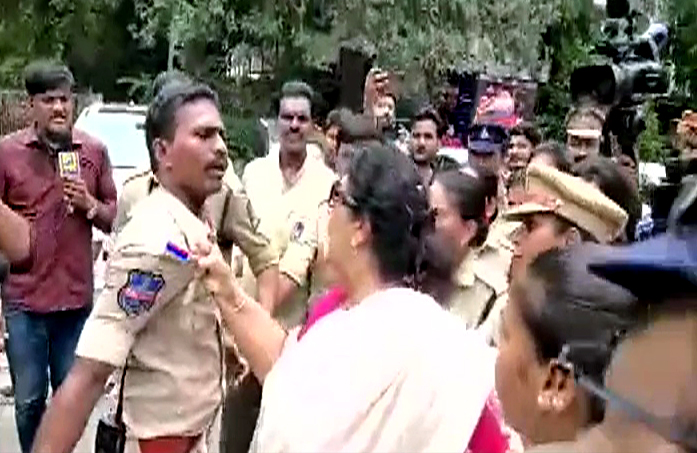To call the agitation Satyagraha is to do great injustice to the man who enriched our political vocabulary by inventing the word.
The Congress party was established in 1885. The founder was A.O. Hume, a former ICS officer.
Until Gandhiji took over the leadership of Congress on his return from South Africa (where he spent 21 years) till then the party did not have a mass base.
Rahul Gandhi has spent 40 hours with the Enforcement Directorate. The Congress party has suddenly woken up, burning tyres on roads, dislocating traffic. One Congressman called the Prime Minister a dog, a former lady Member of Parliament got hold of the collar of a policeman, who was on duty.
On the first day, the slogans of the agitators included, “We are doing ‘Satyagraha’”. Abuse and violence are not part of Satyagraha. If Sonia Gandhi was not indisposed, she, would have, in her own diplomatic, decisive way pulled up these unruly Congresswallahs. However, unintended consequences have surfaced due to the agitation—the Congress agitation has given life to a moribund party.
To call the bedlam Satyagraha is to do great injustice to the man who enriched our political vocabulary by inventing the word, but also made it into a powerful non-violent weapon which fundamentally changed Indian politics.
I doubt if any of the aggressive agitators have ever heard of Gandhiji’s book “Satyagraha in South Africa”. Let me quote from it.
“None of us knew what name to give to our movement… A small prize was therefore announced in Indian Opinion (a paper Gandhiji founded and edited) to be awarded to the reader who invented the best designation for our struggle. The year was 1906. We thus received a number of suggestions…. Shri Maganlal Gandhi (the Mahatma’s cousin) was one of the competitors and he suggested the word ‘Sadagraha’, meaning ‘firmness in a good cause’. I liked the word, but it did not truly represent the whole idea I wished to connote. I therefore corrected it to ‘Satyagraha’. Truth (satya) implies love and firmness (agraha) engenders and therefore serves as a synonym for force. I thus began to call the Indian movement ‘Satyagraha’.”
Geoffrey Ashe, the Anglo-American author, in his book “Gandhi” published a year before Gandhiji’s birth centenary in 1968, wrote, “Satyagraha Gandhi decided, can only employ such weapons as boycotts and strikes. But when authority moves against them they must submit to its blows without retaliation, or go to prison or death without rancour, indeed with joy and courtesy. Full responsibility falls on each one, as a soldier of non-violence Satyagraha implies self-discipline.” Congress agitators, please note.
***
The Central Government finds itself in a spot. It was not the wisest decision taken without the matter being discussed in both Houses of Parliament. A bill could have been passed to introduce the Agnipath scheme.
Why has the decision of Government caused so much anger? Because it was not well thought through. What was the hurry? There are serious differences among some retired senior officers of the armed forces on the value and usefulness of Agnipath. I find even the nomenclature strange. Why not Suryapath?
Youth organisations have vigorously opposed this scheme. Some have called it “hare-brained”. The phrase is not mine.
The former Army Chief, General V.P. Malik gave an interview to the Times of India three days ago. The heading of the four-column interview was, “GOI, Armed Forces Have To Do More Work on Agnipath.”
The last sentence of paragraph one of the interview reads: “The government and the armed forces have to do more work on their outreach, to justify and explain Agnipath to the youth.” The rest of General Malik’s interview was in favour of Agnipath. He argues his case convincingly. He is a much respected former Chief. I have met him a couple of times. I was impressed by his engaging personality and his verbal restraint.
One hopes the widespread violent protests will end soon. But the 17-23-year-old recruits will at the end of four years ask for jobs. If not satisfied, uglier protests could follow.

